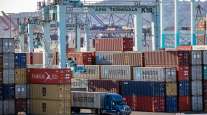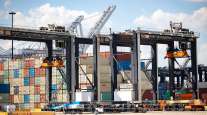Labor Abuse Allegations Tie Up Ships in Australia Ports

[Ensure you have all the info you need in these unprecedented times. Subscribe now.]
Australian authorities detained at least two cargo ships for alleged labor violations related to demands from seafarers to be sent home, some of whom have spent more than a year at sea.
The ships, which are or will be carrying materials for Cargill Inc. and for an aluminum industry joint venture that includes Rio Tinto Group, will be detained until they can adequately address the violations, the Australian Maritime Safety Authority said.
The coronavirus pandemic has disrupted the shipping industry’s general practices for swapping crews, raising costs and creating logistical barriers that have made difficult conditions worse for vulnerable seafarers.
Unions say seafarers who have worked beyond their contracts can legally halt work and demand repatriation. The market should expect more of these kinds of supply chain disruptions if the crew-change crisis is not resolved, according to Peter Sand, chief shipping analyst at industry group BIMCO. As of now, an estimated 250,000 seafarers are working beyond their contract date.
“We can expect some more seafarers to join in on the demands,” said Abhinav Gupta, research analyst at Braemar ACM Shipbroking. While some shipowners are being proactive in seeking to facilitate crew changes, doing so during a pandemic may create “operational challenges for vessels, leading to delays and tightening the fleet availability and thus pushing freight rates up,” he said.
The detention of the Unison Jasper, which was hauling alumina to the Tomago Aluminum smelter north of Sydney, “relates to the failure to ensure seafarers’ employment and social rights under Article IV of the Maritime Labour Convention, including payment of wages, crew repatriation and provision of fresh food,” the ASMA said in a statement. The smelter is a joint venture between Rio Tinto Group, CSR Ltd. and Hydro Aluminium AS.
The vessel is on time-charter to Danish shipping services company Lauritzen Bulkers A/S, which sublet it to a third party, CEO Niels Josefsen said in an email. “Technical management, including crewing, remains with the owners of vessel,” he said.
The ship is owned by Emerald Shipping (HK) Co. Ltd., currently operated by Unison Marine Group and chartered by Pacific Basin, according to the AMSA. Pacific Basin said in a statement that it’s “not involved in matters to do with the vessel’s ship management and crewing.”

Transport Topics introduces its newest digital interview series, Newsmakers, aimed at helping leaders in trucking and freight transportation navigate turbulent times. Audience members will gain access to the industry's leading expert in their particular field and the thoughtful moderation of a Transport Topics journalist. Our second episode — "The Evolution of Electric Trucks" — featured Nikola founder and executive chairman Trevor Milton. To view the replay, complete this form.
Emerald Marine declined to comment.
In Australia, employers are legally responsible for seafarers’ safety, health and welfare, according to Dean Summers, the International Transport Workers’ Federation national coordinator in Australia. “But everyone along the supply chain has a responsibility,” he said. “Traditionally industry stands in a circle and points to the bloke to the left and no one takes the blame.”
The other detained vessel, the Ben Rinnes, didn’t have a valid repatriation plan for seafarers who have been on the ship for more than 13 months, the AMSA said. The vessel is owned by MassMutual Asset Finance, an affiliate of Massachusetts Mutual Life Insurance Co. Laura Crisco, a spokesperson for the parent company, said in an email that it doesn’t typically comment on individual investments.
The vessel was chartered by Cargill Inc. and operated by Navios Shipmanagement Inc., according to the AMSA.
Owners and managers of the Ben Rinnes held discussions with AMSA to understand the concerns and wishes of the crew, and based on these a repatriation plan was made before the vessel arrived in Australia, Navios said in a statement. Once the vessel arrived in the port of Geelong “the situation evolved meaning that the repatriation plan needed to be re-worked.”
RELATED: Supply Chain Risk Grows as Weary Crews Halt Ships and Clog Parts
The company said it’s fully cooperating with AMSA and expects the situation to be resolved soon.
Cargill said in a statement that it was “frustrated to learn of crew members being over contract on the Ben Rinnes, which is unfortunately one of many such cases at the moment,” adding that the firm is working with partners and local authorities to try and repatriate the crew.
Aaron Clark, Annie Lee and Jinshan Hong were the primary contributors to this report.
Want more news? Listen to today's daily briefing:
Subscribe: Apple Podcasts | Spotify | Amazon Alexa | Google Assistant | More




